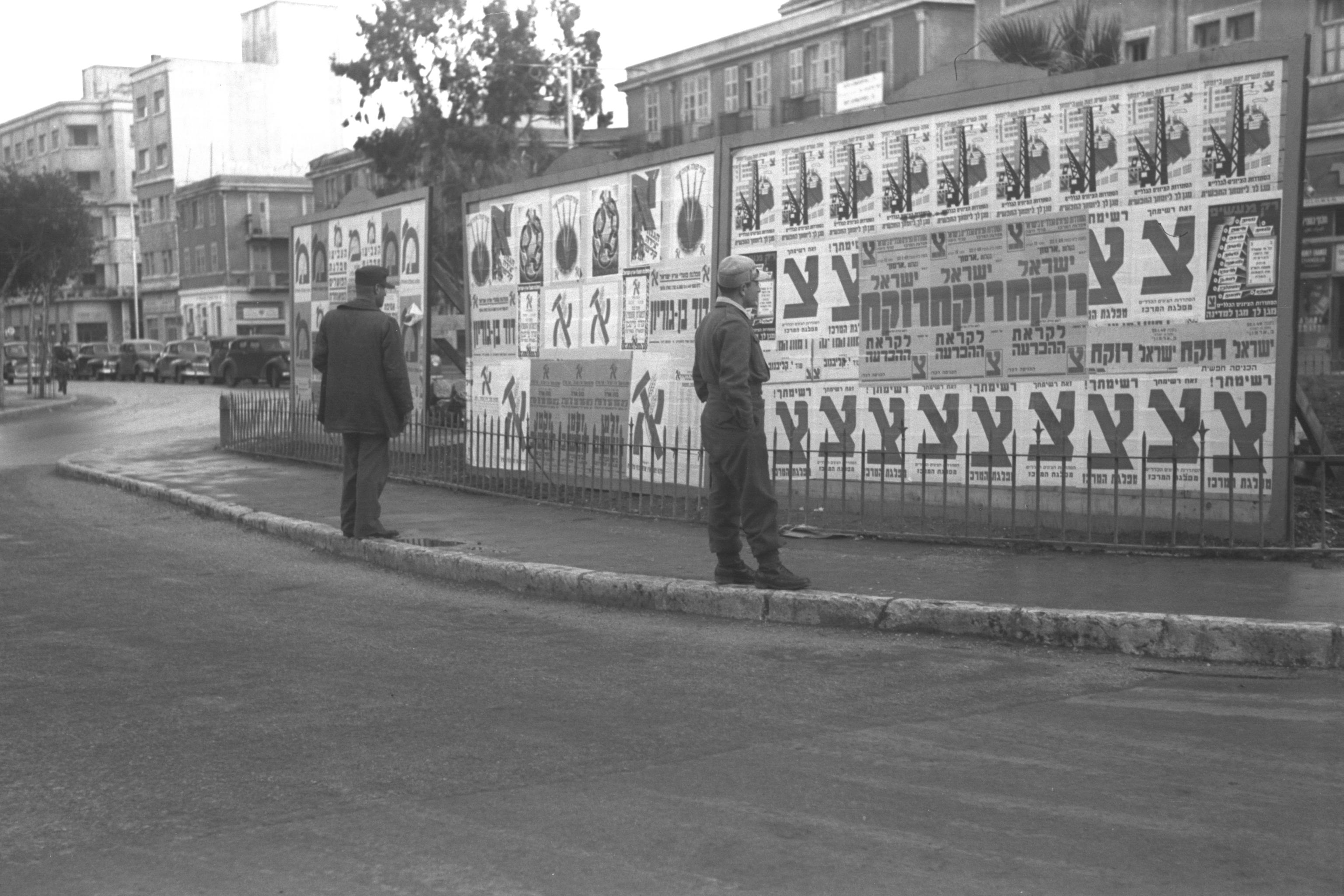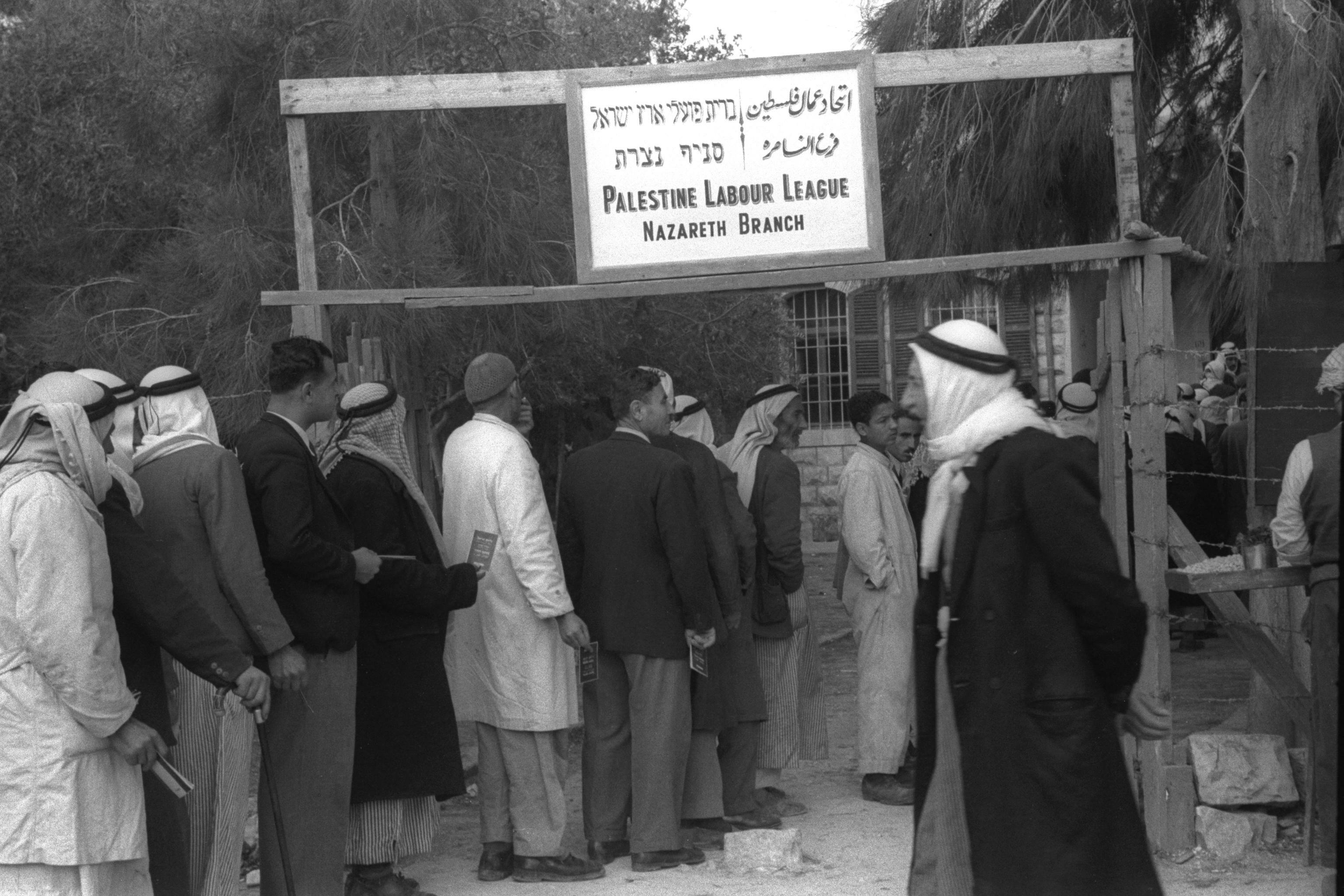1949 Israeli Legislative Election on:
[Wikipedia]
[Google]
[Amazon]

 Constituent Assembly elections were held in newly independent
Constituent Assembly elections were held in newly independent
 During the establishment of the state of Israel in May 1948, Israel's national institutions were established, which ruled the new state. These bodies were not elected bodies in the pure sense, and their members originated from the management of the
During the establishment of the state of Israel in May 1948, Israel's national institutions were established, which ruled the new state. These bodies were not elected bodies in the pure sense, and their members originated from the management of the
 The first government was formed on 8 March 1949 with
The first government was formed on 8 March 1949 with
Historical overview of the First Knesset
Knesset website
Knesset website {{Israeli elections

 Constituent Assembly elections were held in newly independent
Constituent Assembly elections were held in newly independent Israel
Israel (; he, יִשְׂרָאֵל, ; ar, إِسْرَائِيل, ), officially the State of Israel ( he, מְדִינַת יִשְׂרָאֵל, label=none, translit=Medīnat Yīsrāʾēl; ), is a country in Western Asia. It is situated ...
on 25 January 1949. Voter turnout was 86.9%. Two days after its first meeting on 14 February 1949, legislators voted to change the name of the body to the Knesset
The Knesset ( he, הַכְּנֶסֶת ; "gathering" or "assembly") is the unicameral legislature of Israel. As the supreme state body, the Knesset is sovereign and thus has complete control of the entirety of the Israeli government (with ...
(Hebrew: כנסת, translated as ''Assembly''). It is known today as the First Knesset.
Background
 During the establishment of the state of Israel in May 1948, Israel's national institutions were established, which ruled the new state. These bodies were not elected bodies in the pure sense, and their members originated from the management of the
During the establishment of the state of Israel in May 1948, Israel's national institutions were established, which ruled the new state. These bodies were not elected bodies in the pure sense, and their members originated from the management of the Jewish agency
The Jewish Agency for Israel ( he, הסוכנות היהודית לארץ ישראל, translit=HaSochnut HaYehudit L'Eretz Yisra'el) formerly known as The Jewish Agency for Palestine, is the largest Jewish non-profit organization in the world. ...
and from the management of the Jewish National Council
The Jewish National Council (JNC; he, ועד לאומי, ''Va'ad Le'umi''), also known as the Jewish People's Council was the main national executive organ of the Assembly of Representatives of the Jewish community (Yishuv) within Mandatory Pale ...
.
The Israeli Declaration of Independence stated that:
However, the elections were not held before the designated date due to the ongoing war and were cancelled twice. The elections were eventually held on 25 January 1949.
Preparations for the elections
These were the first elections held in Israel, and as such they demanded special preparations. On 5 November 1948 the Provisional State Council decided that the Constituent Assembly would consist of 120 members. On 8 November 1948 a population census was held which was later used in part for the preparations of the voters guide (the census was essential due to the rise of new immigrants and because of the Arab inhabitants of the British Mandate became refugees after the war). For the purpose of the census the entire country was under curfew for seven hours, from five in the afternoon and until midnight. Another issue was the issue of the Electoral System. Suggestions were made of different Electoral Systems, but eventually it was decided to maintain the relative electoral system which existed in the elections for the Assembly of Representatives of theJewish community
Jews ( he, יְהוּדִים, , ) or Jewish people are an ethnoreligious group and nation originating from the Israelites Israelite origins and kingdom: "The first act in the long drama of Jewish history is the age of the Israelites""The ...
in British controlled Palestine, and that the Constituent Assembly elected would be the one to determine the future electoral system in Israel.
A thousand polling stations were prepared across the country. According to census, the number of eligible voters consisted of half a million people.
Contesting parties
A total of 21 parties registered to contest the elections.Results
Aftermath
On 19 May 1948, the Provisional Assembly confirmedHebrew
Hebrew (; ; ) is a Northwest Semitic language of the Afroasiatic language family. Historically, it is one of the spoken languages of the Israelites and their longest-surviving descendants, the Jews and Samaritans. It was largely preserved ...
and Arabic
Arabic (, ' ; , ' or ) is a Semitic language spoken primarily across the Arab world.Semitic languages: an international handbook / edited by Stefan Weninger; in collaboration with Geoffrey Khan, Michael P. Streck, Janet C. E.Watson; Walter ...
as the official languages of Israel
The Israeli population is linguistically and culturally diverse. Hebrew is the country's official language, and almost the entire population speaks it either as native speakers or proficiently as a second language. Its standard form, known as Mod ...
, removing English as an official language. The Constituent Assembly convened in February 1949.
During the Knesset term Eliezer Preminger
Eliezer Preminger (, 13 April 1920 – 15 September 2001) was an Israeli politician who served as a member of the Knesset for Maki, the Hebrew Communists and Mapam between 1949 and 1951.
Biography
Born in Vienna in 1920, Preminger made aliyah ...
left Maki and re-established the Hebrew Communists before joining Mapam, while Ari Jabotinsky
Eri Jabotinsky (, also transliterated ''Ari'', 26 December 1910 – 6 June 1969) was a Revisionist Zionist activist, Israeli politician and academic mathematician. He was the son of Ze'ev Jabotinsky, the founder of the opposition movement within ...
and Hillel Kook
Hillel Kook ( he, הלל קוק, 24 July 1915 –18 August 2001), also known as Peter Bergson (Hebrew: פיטר ברגסון), was a Revisionist Zionist activist and politician.
Kook led the Irgun's efforts in the United States during World ...
, both associated with the Bergson Group in the United States, broke away from Herut; they were not recognised as a separate party by the speaker.
First government
 The first government was formed on 8 March 1949 with
The first government was formed on 8 March 1949 with David Ben-Gurion
David Ben-Gurion ( ; he, דָּוִד בֶּן-גּוּרִיּוֹן ; born David Grün; 16 October 1886 – 1 December 1973) was the primary national founder of the State of Israel and the first prime minister of Israel. Adopting the nam ...
as Prime Minister. His Mapai party formed a coalition with the United Religious Front, the Progressive Party, the Sephardim and Oriental Communities and the Democratic List of Nazareth, and there were 12 ministers. Yosef Sprinzak of Mapai was appointed as the speaker.
On 16 February 1949, the First Knesset elected Chaim Weizmann
Chaim Azriel Weizmann ( he, חיים עזריאל ויצמן ', russian: Хаим Евзорович Вейцман, ''Khaim Evzorovich Veytsman''; 27 November 1874 – 9 November 1952) was a Russian-born biochemist, Zionist leader and Israe ...
as the first (largely ceremonial) President of Israel
The president of the State of Israel ( he, נְשִׂיא מְדִינַת יִשְׂרָאֵל, Nesi Medinat Yisra'el, or he, נְשִׂיא הַמְדִינָה, Nesi HaMedina, President of the State) is the head of state of Israel. The posi ...
. It also passed an educational law in 1949 which introduced compulsory schooling for all children between the ages of 5 to 14.''The Challenge Of Israel'' by Misha Louvish. Publisher: Jerusalem Israel Univ Press; 1st Edition (1968). ASIN B000OKO5U2. On 5 July 1950, it passed the Law of Return
The Law of Return ( he, חֹוק הַשְׁבוּת, ''ḥok ha-shvūt'') is an Israeli law, passed on 5 July 1950, which gives Jews, people with one or more Jewish grandparent, and their spouses the right to relocate to Israel and acquire Isr ...
.
The trend of political instability in Israel was started when Ben-Gurion resigned on 15 October 1950 over disagreements with the United Religious Front on education in the new immigrant camps and the religious education system, as well as demands that the Supply and Rationing Ministry be closed and a businessman appointed as Minister for Trade and Industry.
Second government
Ben-Gurion formed a second government on 1 November 1950 with the same coalition partners as previously, though there was a slight reshuffle in his cabinet;David Remez
David Remez ( he, דוד רמז, 1886 – 19 May 1951) was an Israeli politician, the country's first Minister of Transportation, and a signatory of the Israeli declaration of independence.
Biography
Remez was born David Drabkin in the village o ...
moved from the Transportation ministry to Education, replacing Zalman Shazar
Zalman Shazar ( he, זלמן שז"ר; born Shneur Zalman Rubashov; be, Шнэер За́льман Рубашо́ў; russian: Шне́ер За́лмен Рубашо́в; November 24, 1889 – October 5, 1974) was an Israeli politician, author ...
(who was left out of the new cabinet), whilst Dov Yosef
Dov Yosef ( he, דב יוסף, 27 May 1899 – 7 January 1980) was an Israeli statesman. During the 1948 Arab–Israeli War, he was in charge of Jerusalem. He later held ministerial positions in nine Israeli governments.
Biography
Bernard Jose ...
replaced Remez as Minister of Transportation. Ya'akov Geri was appointed Minister of Trade and Industry despite not being a Member of the Knesset. There was also a new Deputy Minister in the Transportation ministry.
The door was opened for the elections for the second knesset when the government resigned on 14 February 1951 after the Knesset had rejected the Minister of Education and Culture's proposals on the registration of schoolchildren.
See also
* List of members of the first KnessetReferences
External links
Historical overview of the First Knesset
Knesset website
Knesset website {{Israeli elections
Legislative
A legislature is an assembly with the authority to make laws for a political entity such as a country or city. They are often contrasted with the executive and judicial powers of government.
Laws enacted by legislatures are usually known ...
Legislative election
Legislative elections in Israel
Israel
Israel (; he, יִשְׂרָאֵל, ; ar, إِسْرَائِيل, ), officially the State of Israel ( he, מְדִינַת יִשְׂרָאֵל, label=none, translit=Medīnat Yīsrāʾēl; ), is a country in Western Asia. It is situated ...
Israel
Israel (; he, יִשְׂרָאֵל, ; ar, إِسْرَائِيل, ), officially the State of Israel ( he, מְדִינַת יִשְׂרָאֵל, label=none, translit=Medīnat Yīsrāʾēl; ), is a country in Western Asia. It is situated ...